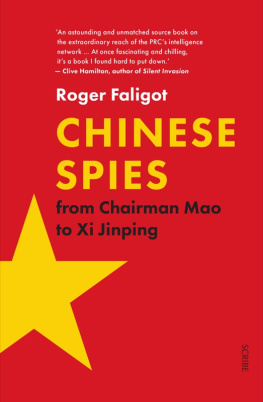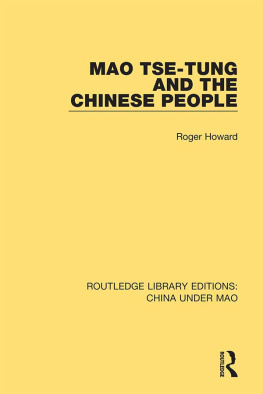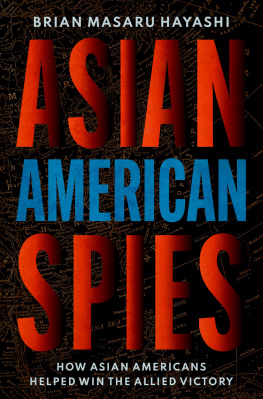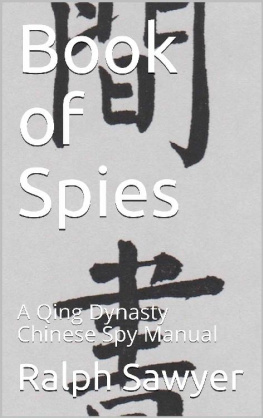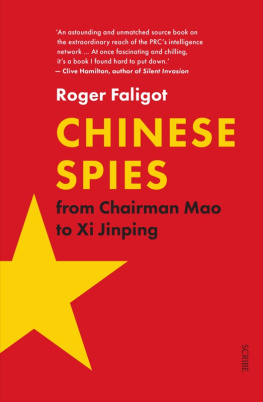Faligot Roger - Chinese Spies
Here you can read online Faligot Roger - Chinese Spies full text of the book (entire story) in english for free. Download pdf and epub, get meaning, cover and reviews about this ebook. year: 2019, publisher: Scribe Publications, genre: Detective and thriller. Description of the work, (preface) as well as reviews are available. Best literature library LitArk.com created for fans of good reading and offers a wide selection of genres:
Romance novel
Science fiction
Adventure
Detective
Science
History
Home and family
Prose
Art
Politics
Computer
Non-fiction
Religion
Business
Children
Humor
Choose a favorite category and find really read worthwhile books. Enjoy immersion in the world of imagination, feel the emotions of the characters or learn something new for yourself, make an fascinating discovery.
- Book:Chinese Spies
- Author:
- Publisher:Scribe Publications
- Genre:
- Year:2019
- Rating:3 / 5
- Favourites:Add to favourites
- Your mark:
- 60
- 1
- 2
- 3
- 4
- 5
Chinese Spies: summary, description and annotation
We offer to read an annotation, description, summary or preface (depends on what the author of the book "Chinese Spies" wrote himself). If you haven't found the necessary information about the book — write in the comments, we will try to find it.
Chinese Spies — read online for free the complete book (whole text) full work
Below is the text of the book, divided by pages. System saving the place of the last page read, allows you to conveniently read the book "Chinese Spies" online for free, without having to search again every time where you left off. Put a bookmark, and you can go to the page where you finished reading at any time.
Font size:
Interval:
Bookmark:

CHINESE SPIES
Roger Faligot is an investigative journalist and author of many books on European and Asian intelligence, including The Chinese Mafia in Europe and La Piscine , the first history of Frances secret services. He has been a correspondent for The European , and Far East correspondent for Intelligence Online (19932018).
Natasha Lehrer s writing has appeared in the Guardian , the TLS , the Nation and many other publications. Her co-translation of Nathalie Lgers Suite for Barbara Loden won the 2017 Scott Moncrieff prize. Other translations include work by Georges Bataille, Robert Desnos, Victor Segalen, Chantal Thomas, and the Dalai Lama.
Scribe Publications
1820 Edward St, Brunswick, Victoria 3056, Australia
First published in French by Nouveau Monde as Les services secrets chinois in 2008
First published in English in the United Kingdom by C. Hurst & Co. (Publishers) Ltd. 2019
Published in Australia and New Zealand by Scribe 2019
Copyright Roger Faligot 2019
Translation Natasha Lehrer 2019
All rights reserved. Without limiting the rights under copyright reserved above, no part of this publication may be reproduced, stored in or introduced into a retrieval system, or transmitted, in any form or by any means (electronic, mechanical, photocopying, recording or otherwise) without the prior written permission of the publishers of this book.
The moral rights of the author and translator have been asserted.
9781925849639 (Australian edition)
9781925548679 (e-book)
A catalogue record for this book is available from the National Library of Australia.
scribepublications.com.au
To Jason Pan
and in memory of David Bonavia
A commanders correct dispositions stem from his correct decisions, his correct decisions stem from his correct judgements, and his correct judgements stem from a thorough and necessary reconnaissance and from pondering on and piecing together the data of various kinds gathered through reconnaissance. He applies all possible and necessary methods of reconnaissance, and ponders on the information gathered about the enemys situation, discarding the dross and selecting the essential, eliminating the false and retaining the true, proceeding from the one to the other and from the outside to the inside.
Quotations from Chairman Mao Zedong
Chapter 23Investigation & Study, 1967
[Problems of Strategy in Chinas Revolutionary War (December 1936),
Selected Works , Vol. I. p. 188]
CONTENTS
: Old Red Spies Never Die
PART ONE
PART TWO
9. : Economic Warfare
PART THREE
12. : China Wins the Espionage Gold
13. : The Guoanbu Saves Xi Jinping
PREFACE
The word Qingbao in Chinese has two meanings: intelligence and information.
The flimsy border between the two concepts facilitates the work of secret agents but complicates that of journalists. A Xinhua News Agency correspondent caught red-handed snooping in the military domain can swear on the memory of Chairman Mao that he was simply engaged in a straightforward reporting assignment, while a western journalist interviewing a supporter of the underground democracy movement is always going to be labelled an imperialist spy. As for the writer or reporter researching the history of Chinese espionage who appears to have a good knowledge of Chinese Lets not even go there.
The spy is Other. Intelligence owes much to psychology. A government policy officer from the Information Section of the Lao Zi Institute might also be an undercover handler, working for one of the various different intelligence services that abound all over the world under some nebulous cultural title; or he might be a true man of letters who simply wants to share his love for Chinese history and philosophy. He could even be both. I have known several highly intellectual spies.
The concept becomes even more interesting when one studies the Chinese characters and roots of the word Qingbao , namely: .
The original meaning of Qing is life light and heart. It can be translated as the reality of the situation, the way things are, the situation put in perspective.
The second character, Bao , originates from an ancient pictogram, simplified in modern times, meaning a person, whose hands are fixed, kneeling, forced to confess. Quite a lot of meaning to unpack in a single character.
This is the original pictogram that is the basis of the character today:

INTRODUCTION
OLD RED SPIES NEVER DIE
In May 2017, Yao Zijian, aged 102, was guest of honour at an extraordinary ceremony in Beijing. As the oldest surviving Chinese spy, he found himself in the midst of a crowd of hundreds: parents and children of Chinese secret agents, who have fought on the underground front since the founding of the Chinese Communist Partyin the war of espionage.
The occasion was the ninetieth anniversary of the Central Committee Special Branch ( Zhongyang Teke ), the oldest of the Chinese secret services, set up in Shanghai on 11 November 1927 under the aegis of the future prime minister, Zhou Enlai. Later renamed the CCP Central Investigation Department ( Zhongyang Diaochabu ), it was for a long time the main political intelligence service, led until the 1980s by the remarkable Luo Qinchang (19182014).
Luos son, General Luo Yuan, addressed a speech to the offspring of these great soldiers of the covert war, lauding the qualities of the nameless agents, who were unwaveringly loyal, fearless, cautious when alone, alert, capable and helpful to each other [T]he spirit that every Party member and soldier should learn from.
This was more than an exercise in homage to the heroic underground militants who engaged in historic espionage, first against the French and British in the Shanghai Concessions, then against Chiang Kai-sheks Kuomintang and spies from Japan. As those in the audience were surely aware, this secret war is an ongoing reality under President Xi Jinping today. The choice of the intelligence service to be honoured, the Diaochabu, was significant in this regard. In the 1980s, it had joined forces with the counterespionage branch of the Ministry of Public Security: the Gonganbu. Together the two services then formed a new Ministry of State Security, the Guojia Anquanbu , or Guoanbu for short. It was the Guoanbu, still in operation today, that organized the anniversary event in 2014. Its first leader, minister Ling Yun, died in March 2018 at the age of 100. The publicity afforded to this ceremony also had another, more immediate purpose, serving as the launch of a new campaign against imperialist spiesthat summer, a draconian new anti-espionage law was passed.
In the twenty-first century, the Guoanbu considers itself to be a global intelligence player as significant as the Soviet KGB was in the twentieth. The Chinese intelligence services, an umbrella term including several other organisations beside the Guoanbu, rival the largest in the world: the American CIA, the Israeli Mossad, the Indian RAW, the French DGSE, Britains MI6, and of course the other intelligence services in the region, such as the Taiwanese MJIB and the Japanese Naicho.
This book explores the longstanding importance of intelligence in communist China. Its multiple origins go back to the fourteenth-century novel Romance of the Three Kingdoms , and Sun Tzus famous treatise The Art of War , as well as the influence of both Russian communism and, paradoxically, enemy states: the French and British secret services fought by Zhou Enlai and his spies in the 1930s, in the Shanghai Concessions. Chinese Spies is an attempt to illustrate both the long history of the intelligence and security services since the creation of the Chinese Communist Party, and their ongoing role in politics today. In 2019, the CCP still preserves a Marxist intelligence tradition that dates back to the interwar period.
Next pageFont size:
Interval:
Bookmark:
Similar books «Chinese Spies»
Look at similar books to Chinese Spies. We have selected literature similar in name and meaning in the hope of providing readers with more options to find new, interesting, not yet read works.
Discussion, reviews of the book Chinese Spies and just readers' own opinions. Leave your comments, write what you think about the work, its meaning or the main characters. Specify what exactly you liked and what you didn't like, and why you think so.

